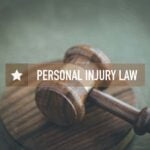Signs & Symptoms of a Concussion After a Car Accident
Of the 3 million people who are injured in car crashes each year, almost 600,000 suffer from traumatic brain injuries (TBI). In fact, motor vehicle accidents are the leading cause of TBI-related hospitalization and deaths. Yet estimates show that over 200,000 concussions and other TBIs remain undiagnosed!
The most likely reason for this is that nearly 75% of the TBIs sustained in motor vehicle crashes are mild. We know these injuries as concussions. Although concussions are very common in car accidents, misconceptions about these injuries abound. In fact, these misconceptions prevent the victim from seeking timely medical help for a concussion, and the victim will often lose the benefits of having an early diagnosis.

Debunking the dangerous myths about concussions:
- You will always lose consciousness: Actually, only a small percentage of people are knocked out or even experience a blackout after a concussion. Most people simply feel confused and dazed, while some may experience short-term amnesia.
- Concussions only result from a direct hit to the head: Yes, a bump or blow to the head has a very high chance of causing a concussion. But according to the CDC, a concussion can also be caused when the head is jolted, and the brain is jostled against the skull, like in the case of rear end accidents that cause whiplash injuries.
- Imaging tests will show all signs of brain injuries: Concussions involve microscopic brain injuries that CT scans and MRIs cannot always detect accurately.
- You will experience post concussive symptoms immediately after the accident: Often the effects of a concussion don’t manifest for weeks after the accident. Microscopic brain injuries can cause tissue atrophy over a period of time and only then are they picked up by imaging tests. Unfortunately, the damaged brain tissue may never completely recover. In such cases, post concussive symptoms are slow in the coming, but they can be severe and last for several years.
The real face of a concussion: 15 signs that can help tell you if you have suffered from mild TBI!
- Chronic headache: One of the most common post concussive symptoms is a headache. As many as 90% of patients suffer from headaches following the trauma, while 75% still continue to suffer from headaches after 3 months, and 20% experience them even at 4 years. If headaches suddenly appear or are more intense after the accident, they may be a cause for concern.
- Visual and auditory abnormalities: Ringing in the ears and the appearance of lightning flashes or bright spots in the vision field are often symptoms of a concussion.
- Nausea: Dizziness, nausea and vomiting after the injury are the first signs of a concussion. If you experience nausea or can’t seem to hold on to your meals, you may be suffering from a mild TBI.
- Loss of coordination and balance: These are classic signs of brain trauma that result from damage to the brain stem, which often occurs in case of a concussion.
- Confusion and reduced awareness: Lack of awareness and confusion or feeling dazed after the accident are often dismissed as signs of shock. But these can be a result of injury to the frontal or parietal lobes.
- Memory problems: Although many crash victims suffer from short-term amnesia, a typical symptom of concussions, a bigger problem for many people is the long-term impact on memory. For up to 6 months or more, memory deficits, including the inability to remember new information and learn new things, are often experienced by those who suffer from a TBI.
- Cognitive deficits: Mental fog, trouble with problem solving, inability to follow conversations, inability to perform complex tasks and slower reactions times can all be the results of damage to the frontal lobe. These symptoms tend to appear within a week of the traumatic event and can get progressively worse over time.
- Behavioral changes: Injury to the frontal and temporal lobes can cause a range of behavioral abnormalities such as aggressiveness and agitation, depression, anxiety, mood swings and lack of empathy. Unfortunately, these are also often ignored because most people believe they stem from the stress caused by the accident.
- Sleep disturbances: Insomnia, the inability to fall asleep or get up, sleeping more than normal, extreme and chronic drowsiness and the inability to stay awake, all result from significant impact to the brain stem. These sleep disturbances are often experienced by victims for 6 months or more after the accident.
- Lack of focus and awareness: Even micro-injuries to the frontal lobe can have a profound impact on person’s ability to concentrate on a task and be aware of his/her surroundings. This is another post concussive symptom that has a delayed onset.
- Verbal deficits: Many patients suffer from distinct verbal deficits after a concussion. This symptom usually does not make an immediate appearance after the trauma, but it can be progressive in nature after onset. Verbal deficits after a concussion are not just limited to the inability to recall the right words, but also include the incapability to form words and pronounce words/sounds properly. Slurred speech often results immediately after a severe TBI.
- Auditory deficits: Injury to the temporal lobes can lead to hearing issues and difficulty in understanding spoken words.
- Vision problems: The occipital lobes at the back of the head control the sense of sight. When you receive a hard jolt that makes the brain ricochet front and back, it can lead to blurred vision, cuts in the visual field, vision illusions and difficulty in identifying colors and objects.
- Fatigue: This is another post concussive symptom that is often ignored because it is considered a side effect of painful physical injuries. Sudden and significant mental and physical fatigue, the kind that impedes day to day activity, can be a sign of brain trauma.
- Sensitivity to light and sound: Mild TBIs can also cause abnormal sensitivity to visual and auditory input.
Loss of consciousness and seizures are also manifestations of brain injury and these can be the symptoms of a mild or severe TBI. Once again, outward signs of head injury such as a bleeding wound are not always indicative of the seriousness of the brain trauma.
Another important point to understand is that the initial classification of a brain injury does not always accurately indicate the severity of the long-term symptoms or even the onset and duration of such symptoms.
A mild TBI (MTBI) is anything but mild!
- In 20% of the patients, depression, cognitive issues and memory problems are experienced for more than 6 months.
- 15% of patients with a MTBI don’t show a complete recovery even after 1 year.
- Concussions lead to a 17% increase in the risk of suffering from dementia.
- MTBI increases the risk of suffering from a stroke by ten times.
But here is the truly shocking bit, and it comes from the developers of the Glasgow Coma Scale. Most victims of TBI, regardless of the initial classification of the injuries, continue to suffer from chronic symptoms and persistent disability even an entire 14 years after the injury.
In light of all that, and considering the fact that insurance companies know about the tremendously high risk of suffering from a concussion in a car crash, you’d expect them to play it fair and simply pay out your claim for MTBI.
But that is not how these corporate giants work. That is why you need an experienced attorney on your side. DeVaughn James Injury Lawyers knows how to use expert testimony and the latest medical technology to prove that a brain injury was indeed suffered and to accurately anticipate its impact on your life.
If you or a loved one has suffered a concussion after a car accident, you may be entitled to compensation. Contact us today at 316-888-8888 and we will help you to get the restitution you need and deserve.
References:
- http://www.kdheks.gov/idp/download/2015_TBI_Special_Emphasis_Report.pdf
- https://www.ncbi.nlm.nih.gov/pmc/articles/PMC3217580/
- https://www.amjmed.com/article/S0002-9343(17)30482-5/pdf
- https://www.cdc.gov/traumaticbraininjury/get_the_facts.html
- https://www.asnr.org/patientinfo/conditions/tbi.shtml
- https://www.biausa.org/brain-injury/about-brain-injury/concussion
- http://braintrauma.org/concussion?tab=3
- https://www.msdmanuals.com/home/brain,-spinal-cord,-and-nerve-disorders/brain-dysfunction/brain-dysfunction-by-location









